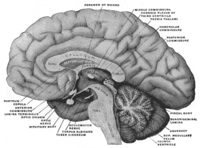
Photo from wikipedia
Abstract: High glucose-induced endothelial activation plays critical roles in the development of diabetic vascular complications. R-spondin 3 could inhibit inflammatory damage, and diabetic vascular inflammation is secondary to endothelial activation.… Click to show full abstract
Abstract: High glucose-induced endothelial activation plays critical roles in the development of diabetic vascular complications. R-spondin 3 could inhibit inflammatory damage, and diabetic vascular inflammation is secondary to endothelial activation. In this article, we identify R-spondin 3 as a novel regulator of high glucose-induced endothelial activation. We found that the serum levels of R-spondin 3 were significantly reduced in type 2 diabetic patients and db/db mice. We observed that the increased expressions of vascular cell adhesion molecule-1, intercellular cell adhesion molecule-1, and monocyte chemoattractant protein-1 (endothelial activation makers) in high glucose-stimulated human umbilical vein endothelial cell lines (HUVECs) could be inhibited by overexpressing R-spondin 3 or human R-spondin 3 recombinant protein. Subsequently, high glucose-induced adhesion and migration of human myeloid leukemia mononuclear cells (THP-1 cells) to HUVECs were markedly suppressed by the overexpression of R-spondin 3 in HUVECs. Moreover, the inhibitory effect of R-spondin 3 on the expressions of vascular cell adhesion molecule-1, intercellular cell adhesion molecule-1, and monocyte chemoattractant protein-1 in high glucose-treated HUVECs could be blocked by knockdown of leucine-rich G protein-coupled receptor 4 (R-spondin 3 receptor) or the specific inhibitor of Wnt/β-catenin pathway. Taken together, R-spondin 3 could suppress high glucose-induced endothelial activation through leucine-rich G protein-coupled receptor 4/Wnt/β-catenin pathway.
Journal Title: Journal of Cardiovascular Pharmacology
Year Published: 2022
Link to full text (if available)
Share on Social Media: Sign Up to like & get
recommendations!